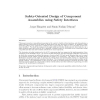Free Online Productivity Tools
i2Speak
i2Symbol
i2OCR
iTex2Img
iWeb2Print
iWeb2Shot
i2Type
iPdf2Split
iPdf2Merge
i2Bopomofo
i2Arabic
i2Style
i2Image
i2PDF
iLatex2Rtf
Sci2ools
114
click to vote
ENTCS
2007
2007
Safety-Oriented Design of Component Assemblies using Safety Interfaces
This paper promotes compositional reasoning in the context of safety-critical systems, and demonstrates a safety-oriented component model using an application from the automotive industry: an Adaptive Cruise Controller (ACC). The application consists of four components for which a set of 18 fault modes have been identified. We show the impact of all single faults and double faults selected from this set, on a safety property associated with the ACC assembly. Analysis related to each fault mode is performed using compositional rules and derived safety interfaces for each component. The derivation of safety interfaces for the ACC components has been supported by implementation of two extensions to the SCADE tool set: (1) a front end that iteratively and automatically builds the environment in which the component is resilient in presence of a given fault, (2) fault mode libraries that can be reused for modeling several classes of faults affecting the input of a component. The result of...
Related Content
| Added | 13 Dec 2010 |
| Updated | 13 Dec 2010 |
| Type | Journal |
| Year | 2007 |
| Where | ENTCS |
| Authors | Jonas Elmqvist, Simin Nadjm-Tehrani |
Comments (0)

